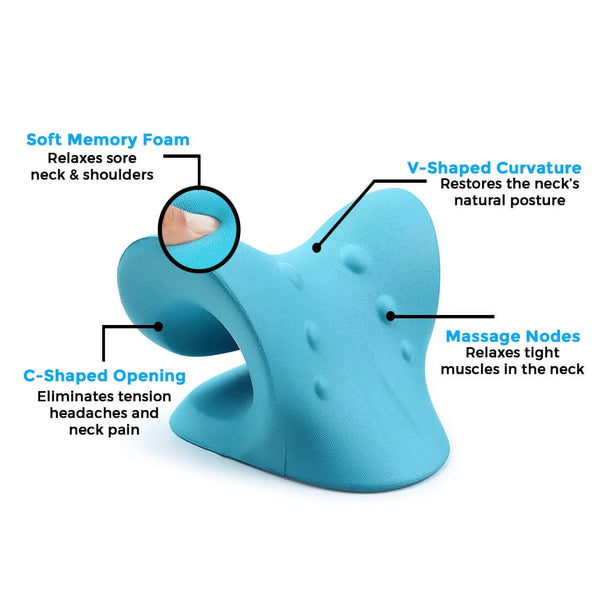Get Long-term Relief with the Neck Cloud: The Ultimate Neck Assistance
Get Long-term Relief with the Neck Cloud: The Ultimate Neck Assistance
Blog Article
The Impact of Stress on Neck Discomfort: Methods for Minimizing Stress and Pain
In today's busy world, it's no secret that stress has actually become a widespread consider the onset and exacerbation of neck discomfort. The intricate connection between tension and muscular tissue stress frequently leaves individuals looking for remedy for the pain that takes place. By discovering targeted approaches intended at lowering tension and promoting relaxation, one can begin to deal with the root triggers of neck pain and work towards an extra balanced state of health. Join us on a trip to unwind the impact of stress and anxiety on neck discomfort and uncover efficient methods to reduce discomfort and improve general top quality of life.
Understanding Stress-Related Neck Pain
Stress-related neck pain can materialize as tension, stiffness, or pain in the neck and shoulder location. The connection in between stress and anxiety and neck discomfort lies in the body's physiological response to tension, which can result in muscle mass tension and rigidity in the neck muscles.

Identifying Common Tension Locations
Regularly experienced by people under stress, stress locations in the body can offer beneficial insights right into the physical symptoms of emotional strain. One usual stress location is the neck, where anxiety frequently shows up physically. Stress headaches, stiff neck muscular tissues, and limited series of activity prevail signs of stress-related neck stress. The shoulders are one more usual area where tension collects. Tension can cause the muscles in the shoulders to tighten up, leading to discomfort and pain. Additionally, the upper back is susceptible to tension build-up, particularly in individuals who experience chronic stress. Poor position and prolonged sitting can intensify stress in this field. The jaw is also a common place for stress-related stress, as lots of people squeeze their jaw or grind their teeth when emphasized. Being conscious of these typical stress areas can aid people identify the physical indications of stress and anxiety and take actions to address them before they escalate right into persistent discomfort or pain.
Implementing Leisure Strategies
To properly handle stress-related tension in the body, executing relaxation techniques is vital. Leisure methods are important tools for minimizing neck discomfort triggered by stress and anxiety. Deep breathing exercises can assist soothe the mind and unwind tense muscle mass in the neck and shoulders (neck cloud). Practicing mindfulness meditation can additionally be useful in easing tension and promoting leisure. Progressive muscular tissue leisure, where you methodically tense and then relax various muscle mass groups, can release built-up tension in the navigate to these guys neck location. Additionally, tasks like yoga exercise and tai chi include both physical activity and relaxation, making them efficient methods for decreasing stress and neck pain. Taking normal breaks throughout the day to stretch and take a break can protect against muscular tissue rigidity and stress from building up. By integrating these relaxation strategies into your daily regimen, you can help take care of stress degrees, lower stress in the neck, and reduce discomfort related to stress-induced neck discomfort.
Integrating Self-Care Practices
Integrating self-care techniques is essential for maintaining overall wellness and managing stress-related neck pain efficiently. Taking part in regular exercise, such as mild extending exercises or yoga, can assist ease stress in the neck and shoulders. Practicing great pose throughout the day and taking regular breaks from long term resting or display time can also avoid stress on the neck muscular tissues.
Moreover, focusing on adequate sleep and developing a consistent rest routine can contribute substantially to minimizing anxiety levels and advertising leisure. Creating a relaxing going to bed regimen, such as reviewing a publication or taking a warm bath, can assist prepare the mind and body for restful rest. In addition, keeping a well balanced diet regimen rich in nutrients and remaining hydrated can support overall health and wellness and minimize inflammation that may aggravate neck discomfort.
Integrating mindfulness methods, such as deep breathing workouts or meditation, can help manage stress and promote relaxation. Requiring time for oneself, taking part in leisure activities, and establishing limits to safeguard individual time are also essential elements of self-care that can add to minimizing stress and alleviating neck pain.
Seeking Expert Assistance
Just how can individuals properly resolve persistent neck discomfort that is influencing their day-to-day live and health? Looking for expert aid can be a critical action in managing and easing neck discomfort. Consulting with medical care experts such as chiropractics physician, physiotherapists, or orthopedic professionals can provide valuable insights and individualized therapy strategies. These professionals can view it now carry out complete evaluations to diagnose the underlying causes of neck discomfort and suggest suitable treatments.
Chiropractics physician concentrate on spinal control methods to improve alignment and decrease tension in the neck location. Physiotherapists supply targeted stretches and workouts to enhance muscles, enhance you can try here flexibility, and improve total neck function. Orthopedic experts can supply sophisticated medical treatments such as shots or surgical choices for extreme cases of neck pain.
Verdict

Stress-related neck pain can show up as stress, stiffness, or discomfort in the neck and shoulder area. The link in between stress and anxiety and neck pain lies in the body's physiological reaction to anxiety, which can result in muscle mass stress and tightness in the neck muscle mass. Tension frustrations, stiff neck muscles, and limited range of motion are common signs and symptoms of stress-related neck stress. By integrating these leisure strategies right into your day-to-day regimen, you can assist handle stress and anxiety levels, minimize tension in the neck, and minimize pain associated with stress-induced neck pain.

Report this page